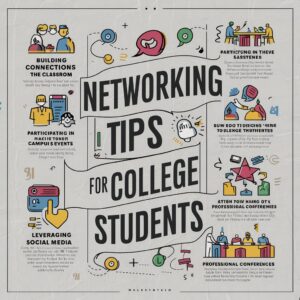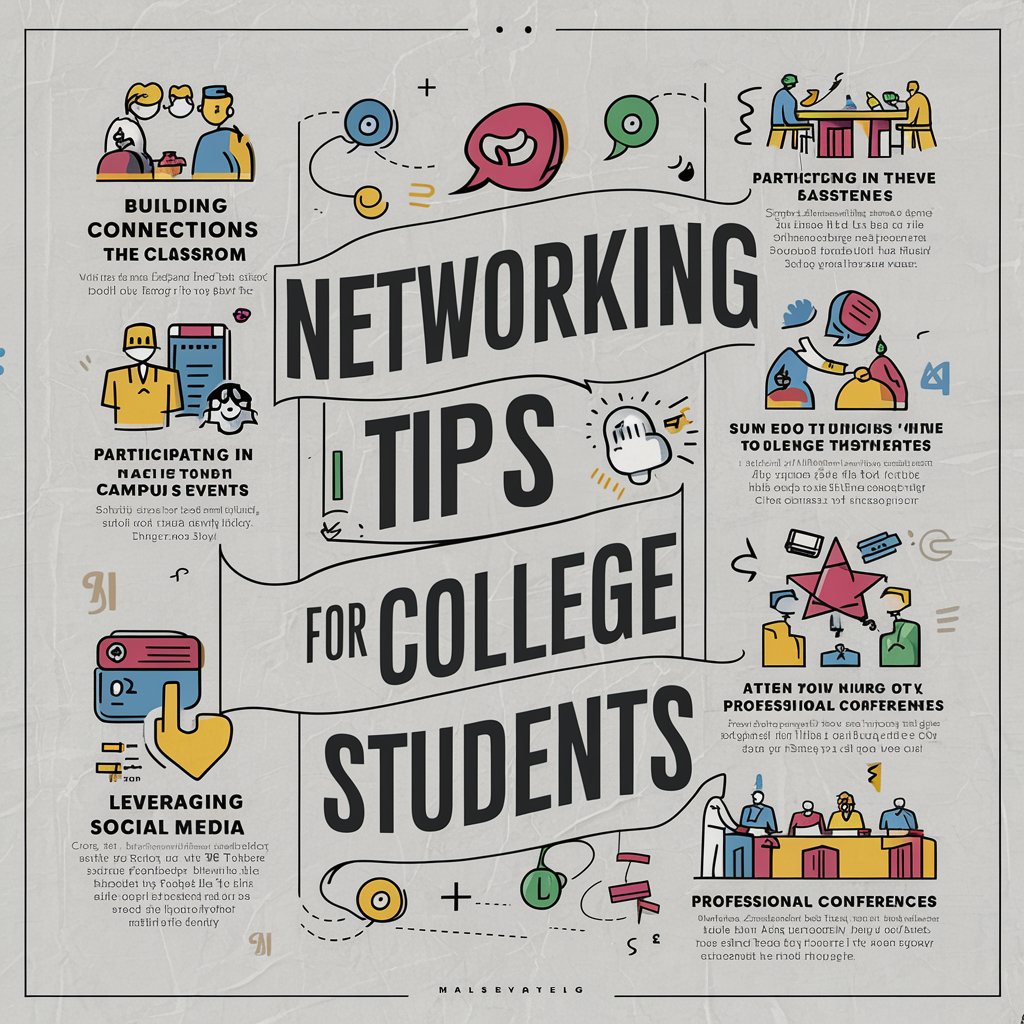
H1: Introduction to Networking in College
H2: Importance of Networking for College Students
H2: Benefits of Building a Professional Network
H1: Preparing for Networking Opportunities
H2: Self-Assessment of Networking Skills
H2: Building an Elevator Pitch
H2: Updating Professional Profiles
H1: Types of Networking Events and Opportunities
H2: On-Campus Networking Events
H2: Industry Conferences and Seminars
H2: Online Networking Platforms
H1: Effective Networking Strategies
H2: Approaching and Introducing Yourself
H2: Asking Meaningful Questions
H2: Active Listening and Engaging in Conversations
H1: Maintaining and Growing Your Network
H2: Follow-Up and Thank-You Notes
H2: Networking Follow-Up Tips
H2: Nurturing Long-Term Connections
H1: Leveraging Networking for Career Success
H2: Seeking Mentorship and Guidance
H2: Exploring Internship and Job Opportunities
H2: Building a Personal Brand Through Networking
H1: Overcoming Networking Challenges
H2: Overcoming Shyness and Nervousness
H2: Dealing with Rejection and Building Resilience
H2: Networking as a Continuous Process
H1: Conclusion
H2: Final Thoughts on Networking Tips for College Students
Networking Tips for College Students
Introduction to Networking in College
Networking is a crucial skill for college students aiming to build professional relationships, explore career opportunities, and cultivate a supportive community. Mastering effective networking techniques can significantly enhance career prospects and personal growth during college years.
Importance of Networking for College Students
Networking facilitates connections with peers, mentors, and professionals in your field, offering insights, guidance, and potential career opportunities.
Benefits of Building a Professional Network
A robust network provides access to job leads, internships, industry trends, and valuable advice, enriching academic and career experiences.
Preparing for Networking Opportunities
Before attending networking events, students should prepare to present themselves confidently and professionally.
Self-Assessment of Networking Skills
Evaluate strengths in communication, interpersonal skills, and professional goals to identify areas for improvement.
Building an Elevator Pitch
Craft a concise introduction highlighting academic achievements, career aspirations, and unique skills to engage with professionals effectively.
Updating Professional Profiles
Optimize LinkedIn profiles and resumes with current accomplishments, skills, and experiences to showcase qualifications to potential connections.
Types of Networking Events and Opportunities
Explore diverse networking platforms and events that cater to different industries and professional interests.
On-Campus Networking Events
Attend career fairs, workshops, and alumni networking sessions hosted by colleges to connect with local employers and alumni.
Industry Conferences and Seminars
Participate in conferences, seminars, and workshops to learn about industry trends, network with professionals, and explore career pathways.

Online Networking Platforms
Utilize LinkedIn, professional forums, and virtual networking events to expand connections beyond campus boundaries and engage with industry professionals globally.
Effective Networking Strategies
Mastering effective networking strategies involves initiating conversations, demonstrating interest, and fostering meaningful connections.
Approaching and Introducing Yourself
Initiate conversations with a confident handshake, introduce yourself with your elevator pitch, and express genuine interest in learning from others.
Asking Meaningful Questions
Engage in discussions by asking insightful questions about career paths, industry challenges, and professional experiences to demonstrate curiosity and engagement.
Active Listening and Engaging in Conversations
Listen actively to understand perspectives, offer thoughtful responses, and build rapport with professionals and peers during networking interactions.
Maintaining and Growing Your Network
Successful networking extends beyond initial meetings to nurturing long-term relationships and leveraging connections for career advancement.
Follow-Up and Thank-You Notes
Send personalized thank-you notes or emails promptly after networking events to express gratitude and reinforce connections.
Networking Follow-Up Tips
Stay connected through social media updates, professional updates, and occasional check-ins to stay top of mind with connections.
Nurturing Long-Term Connections
Build trust and credibility by offering assistance, sharing industry insights, and supporting peers and mentors in their professional endeavors.
Leveraging Networking for Career Success
Utilize networking opportunities to explore career paths, seek mentorship, and access internship and job opportunities aligned with career goals.
Seeking Mentorship and Guidance
Identify mentors within your network to gain career advice, industry insights, and guidance on professional development strategies.
Exploring Internship and Job Opportunities
Leverage network connections to access internship postings, job referrals, and insider information about company cultures and hiring processes.
Building a Personal Brand Through Networking
Consistently showcase skills, achievements, and passions to reinforce a positive personal brand and attract professional opportunities within your network.
Overcoming Networking Challenges
Overcoming common networking challenges requires resilience, confidence-building, and continuous skill development.
Overcoming Shyness and Nervousness
Practice networking skills, attend smaller events, and focus on listening and learning to build confidence in social settings.
Dealing with Rejection and Building Resilience
Accept rejection gracefully, view setbacks as learning opportunities, and persevere in expanding your network and exploring new connections.
Networking as a Continuous Process
Embrace networking as a lifelong skill, continuously expanding your network, and adapting to changing career landscapes and professional goals.
Conclusion
Networking is a dynamic process that empowers college students to cultivate relationships, explore career opportunities, and enhance professional development. By honing networking skills and leveraging connections effectively, students can navigate their academic journey and achieve long-term career success.
Final Thoughts on Networking Tips for College Students
Embrace networking as a strategic tool for personal growth, career exploration, and community building, fostering meaningful connections that contribute to lifelong success.


